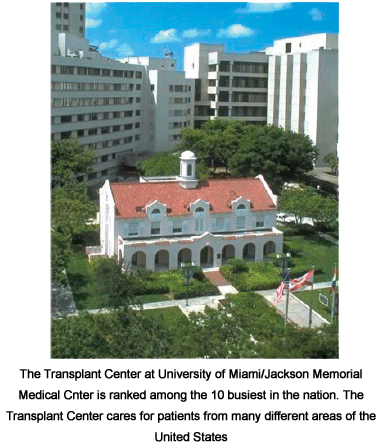How Transplants Affect Families:
 Transplant families are required to stay in the Miami area for a period of 1-6 months after transplant
to be evaluated and closely followed. This time frame can impact a family in many ways. Most insurances and state
Medicaid programs will cover the cost of transplantation and post transplant medications, however there are many expenses
that these funding sources do not cover. Transplantation does not discriminate. Families come from all walks of life.
Transplant can affect the disenfranchised family to intact, resourceful families. Fundraising is encouraged pre-transplant,
however, if a family is unable to raise sufficient funds they will unfortunately experience stress in many areas other
than transplant. Several financial burdens can include medication co-pays, deductibles, diapers, formula, housing, hospital
parking, food, essentials, transportation, utilities, rent , clothing, and lost wages. It is often that one or both parents
are present during the pre and post transplant course, and may be unable to work. The largest financial strain that
transplant parents may face is housing. The hospital has access to housing through the Ronald McDonald House and the
Transplant House, however, these houses are often full, and families are placed on waiting lists. Hotels are limited in the
downtown Miami area. If a family is successful with fundraising or has other means, they may be able to rent an outside
apartment or home. This is however not always the situation. A challenging social situation can complicate the transplant
process. In some cases a parent is unable to be present with his/ her child in Miami due to fear of losing a job. There may
be lack of child care for a patient's siblings. Intact families, single parents, children without parents, all deserve an
opportunity to recover after transplant in a safe, stable home environment. Many families require assistance to overcome all
the obstacles. Transplant families are required to stay in the Miami area for a period of 1-6 months after transplant
to be evaluated and closely followed. This time frame can impact a family in many ways. Most insurances and state
Medicaid programs will cover the cost of transplantation and post transplant medications, however there are many expenses
that these funding sources do not cover. Transplantation does not discriminate. Families come from all walks of life.
Transplant can affect the disenfranchised family to intact, resourceful families. Fundraising is encouraged pre-transplant,
however, if a family is unable to raise sufficient funds they will unfortunately experience stress in many areas other
than transplant. Several financial burdens can include medication co-pays, deductibles, diapers, formula, housing, hospital
parking, food, essentials, transportation, utilities, rent , clothing, and lost wages. It is often that one or both parents
are present during the pre and post transplant course, and may be unable to work. The largest financial strain that
transplant parents may face is housing. The hospital has access to housing through the Ronald McDonald House and the
Transplant House, however, these houses are often full, and families are placed on waiting lists. Hotels are limited in the
downtown Miami area. If a family is successful with fundraising or has other means, they may be able to rent an outside
apartment or home. This is however not always the situation. A challenging social situation can complicate the transplant
process. In some cases a parent is unable to be present with his/ her child in Miami due to fear of losing a job. There may
be lack of child care for a patient's siblings. Intact families, single parents, children without parents, all deserve an
opportunity to recover after transplant in a safe, stable home environment. Many families require assistance to overcome all
the obstacles. |